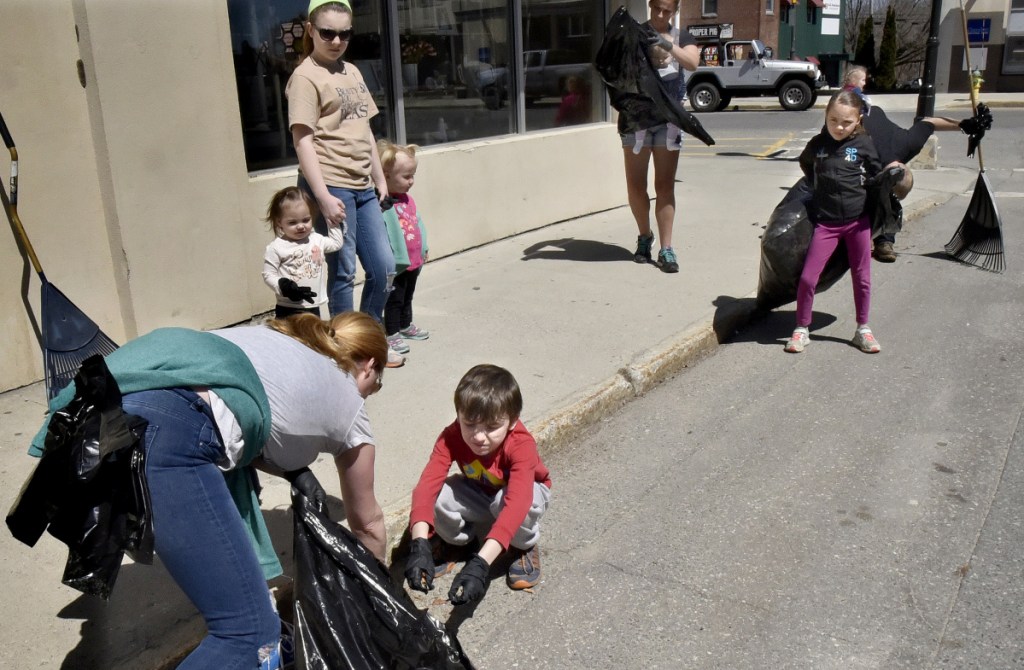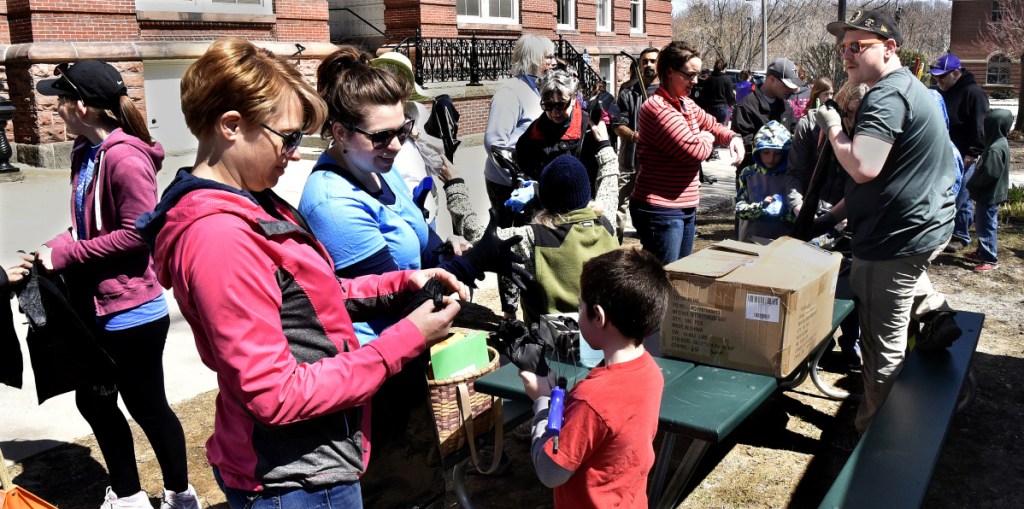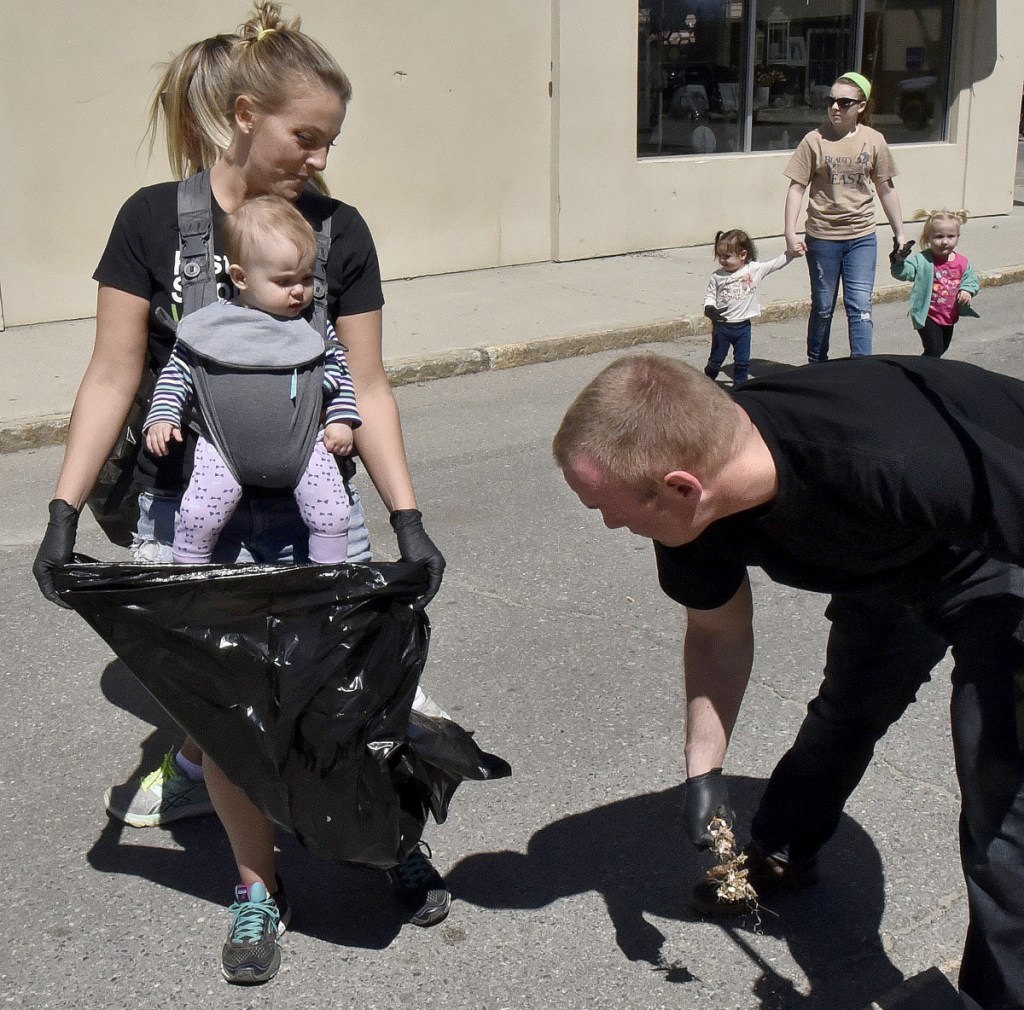WATERVILLE — Some people gave up food, some picked up litter, some arose early to attend a sunrise service: Earth Day got people thinking and moving in Waterville Sunday.
The day to honor the environment has been held annually on April 22 since 1970, when it was founded by the late Sen. Gaylord Nelson of Wisconsin, an environmentalist and former governor.
The “Fast for a Fast Transition to Renewable Energy” drew 25 participants, whose aim was to raise awareness about climate change and the importance of keeping the climate healthy for future generations.
Dick Thomas, longtime member of the Universalist Unitarian Church on Silver Street, hoped that they would fast for a combined total of more than 40 days and 40 nights.
About 100 people also took to downtown streets to pick up litter and other debris, and nine early birds watched the sun rise at the intersection of Summer and Sherwin streets.
Thomas later presented an Earth-focused sermon at the church and afterward met with about a dozen people, many of whom were fasting, to discuss climate change.
“At the end of the century, if we haven’t done a lot more to cut down on gas emissions and sequester a lot of C02 already in the atmosphere, it’s going to be a climate catastrophe,” Thomas said. “And that means it will either be really bad for living here – or unsurvivable. Of course, nobody wants to hear that.”
The group, which included educators, at least one lawyer and a college student, talked about how people are often turned off and stop listening when someone talks about climate change and the disaster it portends if not addressed.
So, they said, they focus on telling them how contributing to the effort to reduce climate change can affect people personally, by keeping them warmer in their home during a cold winter or saving money, for instance. It can also help improve the economy, they said. Purchasing a heat pump, driving an electric car, installing solar panels, insulating and sealing places in a home where air can blow through are simple steps one may take, they said.
Iver Lofving, a Skowhegan teacher, said Universalist Unitarian Church officials 10 years ago insulated the church and split it into two zones, which made the building a lot warmer and saved the church between $7,500 and $10,000 in total so far.
“Being green means green in your pocket,” Lofving said.
Lofving drives an electric car and said it costs him a penny a mile to drive it.
Thomas, a psychologist, said climate change already is starting to reduce the amount of food farmers produce in their fields.
“So, in the future, there will be more food insecurity,” he said.
The group hopes to invite local legislators and those running for office to the church for a discussion focusing on the environment, and plans to ask if they believe in climate change and what they will do to address it.
“Will you be a hero for our grandchildren?” Thomas said, citing one question to be posed.
Jim Easton said those who oppose addressing climate change believe that the Earth is not going to be destroyed and they are probably right because the Earth will continue to exist, even if people do not.
“Whether we’re passengers or not, what we do destroy is human habitat, and that is what this is about and we need to say it,” he said. “This is devastation of our habitat.”
Anna Beth Rynders said she thought the idea of fasting as a way to raise awareness would be effective.
“Fasting is always something that calls attention to important issues,” she said.
Jon Rogers said there is economic development to be had through implementing clean energy. “Look what the Marshall Plan did for Europe,” he said. “If there’s a political will, we could do the same thing.”
Rogers was referring to the U.S. effort to help rebuild western Europe economies after World War II.
He also said one of the greatest food resources in the history of the world – the Gulf of Maine – has slipped away.
Lofving concurred, saying he had a T-shirt 10 or 15 years ago that had pictures of sea urchins, clams, mussels, red crab and rock crab on it, and he realized that those sea creatures are almost gone from the gulf.
“The most common stuff 10 to 15 years ago in the Gulf of Maine – it’s almost all gone,” he said. “All of it has degraded that much.”
Jan Gray said it is important to keep young people involved in the effort to address climate change.
“We want to keep our youth safe and they, in turn – the ones that are on the college level and high school – can do so much,” she said.
Melanie Lanctot said she finds that being involved keeps her from “sinking into a morass of feeling hopeless.”
“Mentally, it seems to be good to be trying to do something,” she said.
Julie Dupont said there are lots of ways for people who cannot fast because of health reasons to join the effort, by not drinking from plastic bottles, for instance, or refraining from buying fossil fuels.
As Dupont was leaving the meeting, she said she was glad she came.
“I wanted to be part of a community movement to improve and protect our Earth,” she said.
Linda Woods, coordinator for the community group Sustain Mid-Maine, invited participants to go to Castonguay Square downtown where Sustain Mid Maine’s Rethink, Reduce, Reuse and Recycle Team, Kennebec Messalsonskee Trails, Friends of Waterville Schools and hair salons that use Aveda products were to host a community cleanup from 1 p.m. to 3 p.m.
“We have gloves — we have garbage bags,” said Woods.
Amy Calder can be reached at 861-9247 or at:
acalder@centralmaine.com
Twitter: @AmyCalder17
Send questions/comments to the editors.






Success. Please wait for the page to reload. If the page does not reload within 5 seconds, please refresh the page.
Enter your email and password to access comments.
Hi, to comment on stories you must . This profile is in addition to your subscription and website login.
Already have a commenting profile? .
Invalid username/password.
Please check your email to confirm and complete your registration.
Only subscribers are eligible to post comments. Please subscribe or login first for digital access. Here’s why.
Use the form below to reset your password. When you've submitted your account email, we will send an email with a reset code.